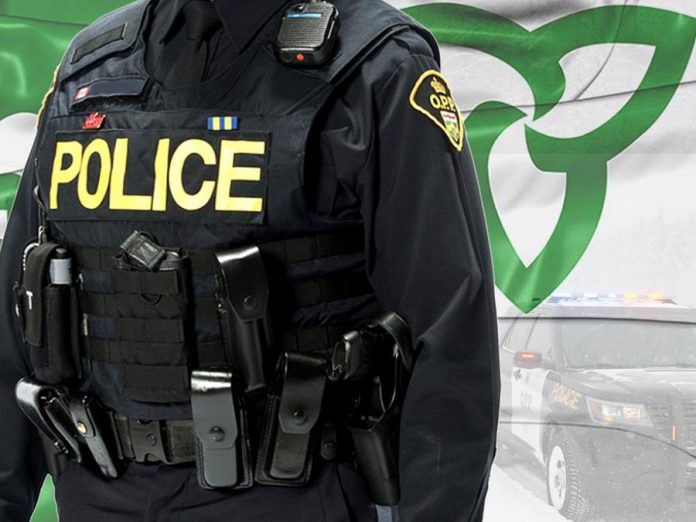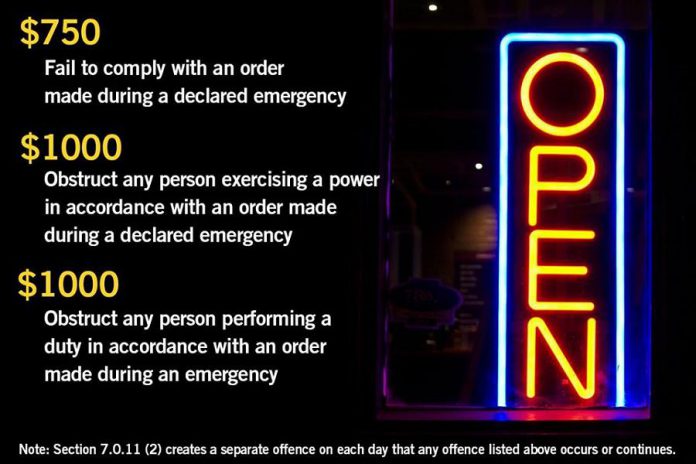
On Friday (March 20), the Ontario Provincial Police (OPP) issued a media release advising how police would be using new fines to enforce compliance with the state of emergency declared in Ontario for the COVID-19 pandemic.
This has created some confusion among some people, who are wondering why police aren’t enforcing public health recommendations.
We hope to clear up some of that confusion here.
What are the new fines being used by the police?
The OPP says the Provincial Offences Act has been updated to include three new offences with set fines for those who do not comply with Ontario’s state of emergency.
This includes a $750 fine for failure to comply with an order made during a declared emergency, a $1,000 fine for obstructing any person exercising a power in accordance with an order made during a declared emergency, and a $1,000 fine for obstructing any person performing a duty in accordance with an order made during a declared emergency. Corporations can be fined $500,000.
Any of these fines can be applied on each day that an offence occurs or continues.

Who do these fines apply to?
Prior to March 24, 2020, the fines described by the OPP were only applicable to certain types of businesses and organizations included in the state of emergency that was made on March 17, 2020 under Ontario’s Emergency Management and Civil Protection Act.
These are specifically: bars and restaurants (except for the provision of takeout and food delivery), facilities providing indoor recreational programs, public libraries, private schools, licensed child care centres, movie cinemas and theatres (including those offering live performances of music, dance and other art forms), and concert venues. So, if an owner or operator of a type of business or organization that is on the above list remains open during the state of emergency, an offence has occurred and the owner or operator may be fined.
However, on March 23, 2020, the Ontario government expanded its state of emergency to order the mandatory closure of all non-essential workplaces effective as of Tuesday, March 24th at 11:59 p.m. for 14 days (see the list of essential workplaces).
This means that, effective Tuesday, March 24th, the fines will also apply to any business not deemed essential by the Ontario government that remains open.
In addition, the March 17th state of emergency also prohibited any organized public event of over 50 people, including parades, events, and communal services within places of worship. However, on March 28, 2020, the Ontario government made a new emergency order under Ontario’s Emergency Management and Civil Protection Act that prohibits public events and social gatherings of more than five people, replacing the previous emergency order prohibiting gatherings of more than 50 people. Exceptions apply to private households with five people or more, child care centres supporting front-line health care workers and first responders (limit of 50 people), and funerals (limit of 10 people at a time).
So, if the organizer or host of an event (or a place of worship), holds an event with more than five people, an offence has occurred and the organizer or host (or a place of worship) may be fined.
Who do these fines NOT apply to?
Prior to March 23, 2020, these fines only applied to any types of businesses or organizations that were included in the state of emergency that was made on March 17, 2020 under Ontario’s Emergency Management and Civil Protection Act. Retail stores and services, grocery stores, liquor and beer stores, drug stores, any commercial or industrial business (including manufacturers), and organizations (charitable or otherwise), were not included in the state of emergency.
However, on Tuesday, March 23rd, that all changed when the Ontario government expanded its state of emergency to order the mandatory closure of all non-essential workplaces by Tuesday, March 24th at 11:59 p.m. for 14 days. This means that the fines will also now apply to all businesses except those defined as essential workplaces by the Ontario government (see the list of essential workplaces).
The fines also currently do not apply to people who are contravening the directives issued by public health authorities, such as social distancing guidelines or the recommendation for 14 days of self-isolation after returning from travel. Enforced compliance with public health recommendations is not currently included in Ontario’s state of emergency orders. However, on Wednesday, March 25th, the Government of Canada invoked the Quarantine Act to requires all travellers returning to Canada (with the exception of what the federal government is calling “essential workers”) to enter a mandatory 14-day period of isolation, regardless of whether any symptoms of COVID-19 are present. Police are waiting for instructions from the federal government on enforcement of the legislation.
Why is there confusion?
Some people are wondering why businesses that employ more than 50 people aren’t being required to shut down, or why the OPP are allowing groups of more than 50 people to congregate.
That’s because the March 17th orders under Ontario’s Emergency Management and Civil Protection Act only restricted an “organized public event” of more than 50 people (including in places of worship). Since this restriction was based on the same recommendations we’ve been hearing about from Ontario’s chief medical officer of health, people have been confused by what’s allowed and what’s not.
Events of more than 50 people were not allowed to take place but workplaces with more than 50 people were still allowed to be open. That has now changed with the Ontario government’s March 23rd order of the mandatory closure of all non-essential workplaces for 14 days as of Tuesday, March 24th.
After March 24th, only some businesses will be allowed to remain open. The government will be releasing a full list of these businesses on Tuesday, March 24th (see the list of essential workplaces).
On March 28, 2020, the Ontario government made a new emergency order under Ontario’s Emergency Management and Civil Protection Act that prohibits public events and social gatherings of more than five people, replacing the previous emergency order prohibiting organized public events of more than 50 people. Exceptions apply to private households with five people or more, child care centres supporting front-line health care workers and first responders (limit of 50 people), and funerals (limit of 10 people at a time).
Why are the fines so low?
Some people may feel that a $750 fine for an individual who fails to comply with an emergency order is not punishment enough. But it’s important to note this fine is only under the Provincial Offences Act.
Under the Emergency Management and Civil Protection Act, the punishment for offences is much higher: a fine up to a $100,000 and up to a year in prison for an individual, a fine up a $500,000 and up to a year in prison for a director or officer of a corporation, and a fine up to $10 million for a corporation.
It is likely that the new offences under the Provincial Offences Act are intended to deal with situations that do not justify the much higher fines and prison terms.
With the above information in hand, if you know of an individual, business, or organization that is breaking the law, you can call the OPP at 1-888-310-1122 or visit opp.ca/reporting.
Why aren’t the police enforcing public health recommendations?
It seems as if everyone knows someone who isn’t following public health recommendations, such as groups of people who are gathering together, or people who are not self-isolating for 14 days after returning from travel outside the country.
While ignoring public health recommendations is socially irresponsible behaviour and a potential threat to public health, it is — currently, at least — not against the law.
It seems like it should be, especially for those of us who are undergoing inconvenience and hardship playing by the rules only to see others flaunt them.
But the police can’t charge people who are gathering together, and they can’t charge someone who is not self-isolating. They can only charge people and corporations that aren’t complying with the orders under the Emergency Management and Civil Protection Act.
UPDATES
On Wednesday, March 25th, the Government of Canada invoked the Quarantine Act to requires all travellers returning to Canada (with the exception of what the federal government is calling “essential workers”) to enter a mandatory 14-day period of isolation, regardless of whether any symptoms of COVID-19 are present. Police are waiting for instructions from the federal government on enforcement of the legislation; in the interim, report any non-compliance allegations to your local public health unit.
On March 28, 2020, the Ontario government made a new emergency order under Ontario’s Emergency Management and Civil Protection Act that prohibits public events and social gatherings of more than five people, replacing the previous emergency order prohibiting organized public events of more than 50 people. Exceptions apply to private households with five people or more, child care centres supporting front-line health care workers and first responders (limit of 50 people), and funerals (limit of 10 people at a time). That means that police can also now charge people who are gathering together in groups of more than five.
What can the government do to enforce public health recommendations?
Legislation is available both at the provincial and federal levels to enforce public health directives.
In Ontario, the Health Protection and Promotion Act doesn’t support the declaration of “public health emergencies” (which is why the Ontario government used the Emergency Management and Civil Protection Act), but it does allow Ontario’s chief medical officer of health to order a person to go into isolation if they are infected with a communicable disease — with a fine of up to $5,000 per day for contravening the order.
And of course there’s Ontario’s Emergency Management and Civil Protection Act, which the government has already used and could use again to make it illegal to contravene public health directives.
The federal Quarantine Act, which was created in 2005 following Canada’s SARS outbreak, allows the federal government to quarantine individuals arriving in the country to prevent the “introduction and spread of communicable diseases.” It was used during the current COVID-19 pandemic to quarantine Canadians, repatriated from cruise ships, at a military base in Trenton, Ontario. Anyone who breaks quarantine under that legislation can be fined up to $1 million and imprisoned for up to three years.
On Wednesday, March 25th, the Government of Canada invoked the Quarantine Act to requires all travellers returning to Canada (with the exception of what the federal government is calling “essential workers”) to enter a mandatory 14-day period of isolation, regardless of whether any symptoms of COVID-19 are present. Police are waiting for instructions from the federal government on enforcement of the legislation.
There’s also the federal Emergencies Act, which authorizes the taking of special temporary measures to ensure safety and security during national emergencies. In 1988, it replaced the War Measures Act which was used during both the First and Second World Wars and during the 1970 October Crisis. The Emergencies Act has never been used.
So far, the federal government has expressed reluctance at using the Emergencies Act for public health directives, primarily because it requires significant resources for enforcement and suspends civil rights — the equivalent of martial law.
However, if enough people continue to ignore public health directives and if the COVID-19 pandemic gets out of control, the federal government may be left with no choice.
For all of our sakes, let’s hope it doesn’t come to that.
This story was originally published prior to the Ontario government expanding the state of emergency to order the mandatory closure of all non-essential workplaces for 14 days effective March 24, 2020. It has since been updated to reflect this development, as well as the federal government invoking the Quarantine Act to require all travellers returning to Canada to enter a mandatory 14-day period of isolation, and the expansion of Ontario’s state of emergency to prohibit gatherings of more than five people.



























